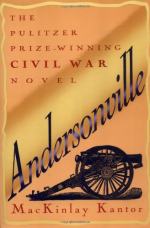Jack was soon so badly beaten as to be unable to cry “enough!” One of his friends did that service for him, the fight ceased, and thenceforth Mr. Oliver resigned his pugilistic crown, and retired to the shades of private life. He died of scurvy and diarrhea, some months afterward, in Andersonville.
The almost hourly scenes of violence and crime that marked the days and nights before the Regulators began operations were now succeeded by the greatest order. The prison was freer from crime than the best governed City. There were frequent squabbles and fights, of course, and many petty larcenies. Rations of bread and of wood, articles of clothing, and the wretched little cans and half canteens that formed our cooking utensils, were still stolen, but all these were in a sneak-thief way. There was an entire absence of the audacious open-day robbery and murder —the “raiding” of the previous few weeks. The summary punishment inflicted on the condemned was sufficient to cow even bolder men than the Raiders, and they were frightened into at least quiescence.
Sergeant Hill’s administration was vigorous, and secured the best results. He became a judge of all infractions of morals and law, and sat at the door of his tent to dispense justice to all comers, like the Cadi of a Mahometan Village. His judicial methods and punishments also reminded one strongly of the primitive judicature of Oriental lands. The wronged one came before him and told his tale: he had his blouse, or his quart cup, or his shoes, or his watch, or his money stolen during the night. The suspected one was also summoned, confronted with his accuser, and sharply interrogated. Hill would revolve the stories in his mind, decide the innocence or guilt of the accused, and if he thought the accusation sustained, order the culprit to punishment. He did not imitate his Mussulman prototypes to the extent of bowstringing or decapitating the condemned, nor did he cut any thief’s hands off, nor yet nail his ears to a doorpost, but he introduced a modification of the bastinado that made those who were punished by it even wish they were dead. The instrument used was what is called in the South a “shake” —a split shingle, a yard or more long, and with one end whittled down to form a handle. The culprit was made to bend down until he could catch around his ankles with his hands. The part of the body thus brought into most prominence was denuded of clothing and “spanked” from one to twenty times, as Hill ordered, by the “shake” in same strong and willing hand. It was very amusing—to the bystanders. The “spankee” never seemed to enter very heartily into the mirth of the occasion. As a rule he slept on his face for a week or so after, and took his meals standing.
The fear of the spanking, and Hill’s skill in detecting the guilty ones, had a very salutary effect upon the smaller criminals.
The Raiders who had been put into irons were very restive under the infliction, and begged Hill daily to release them. They professed the greatest penitence, and promised the most exemplary behavior for the future. Hill refused to release them, declaring that they should wear the irons until delivered up to our Government.




